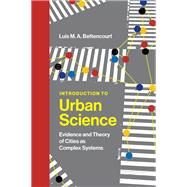Introduction to Urban Science Evidence and Theory of Cities as Complex Systems
, by Bettencourt, Luis M. A.- ISBN: 9780262046008 | 0262046008
- Cover: Hardcover
- Copyright: 8/17/2021
A novel, integrative approach to cities as complex adaptive systems, applicable to issues ranging from innovation to economic prosperity to settlement patterns.
Human beings around the world increasingly live in urban environments. In Introduction to Urban Science, Luis Bettencourt takes a novel, integrative approach to understanding cities as complex adaptive systems, claiming that they require us to frame the field of urban science in a way that goes beyond existing theory in such traditional disciplines as sociology, geography, and economics. He explores the processes facilitated by and, in many cases, unleashed for the first time by urban life through the lenses of social heterogeneity, complex networks, scaling, circular causality, and information.
Though the idea that cities are complex adaptive systems has become mainstream, until now those who study cities have lacked a comprehensive theoretical framework for understanding cities and urbanization, for generating useful and falsifiable predictions, and for constructing a solid body of empirical evidence so that the discipline of urban science can continue to develop. Bettencourt applies his framework to such issues as innovation and development across scales, human reasoning and strategic decision-making, patterns of settlement and mobility and their influence on socioeconomic life and resource use, inequality and inequity, biodiversity, and the challenges of sustainable development in both high- and low-income nations. It is crucial, says Bettencourt, to realize that cities are not "zero-sum games" and that knowledge, human cooperation, and collective action can build a better future.
Human beings around the world increasingly live in urban environments. In Introduction to Urban Science, Luis Bettencourt takes a novel, integrative approach to understanding cities as complex adaptive systems, claiming that they require us to frame the field of urban science in a way that goes beyond existing theory in such traditional disciplines as sociology, geography, and economics. He explores the processes facilitated by and, in many cases, unleashed for the first time by urban life through the lenses of social heterogeneity, complex networks, scaling, circular causality, and information.
Though the idea that cities are complex adaptive systems has become mainstream, until now those who study cities have lacked a comprehensive theoretical framework for understanding cities and urbanization, for generating useful and falsifiable predictions, and for constructing a solid body of empirical evidence so that the discipline of urban science can continue to develop. Bettencourt applies his framework to such issues as innovation and development across scales, human reasoning and strategic decision-making, patterns of settlement and mobility and their influence on socioeconomic life and resource use, inequality and inequity, biodiversity, and the challenges of sustainable development in both high- and low-income nations. It is crucial, says Bettencourt, to realize that cities are not "zero-sum games" and that knowledge, human cooperation, and collective action can build a better future.







